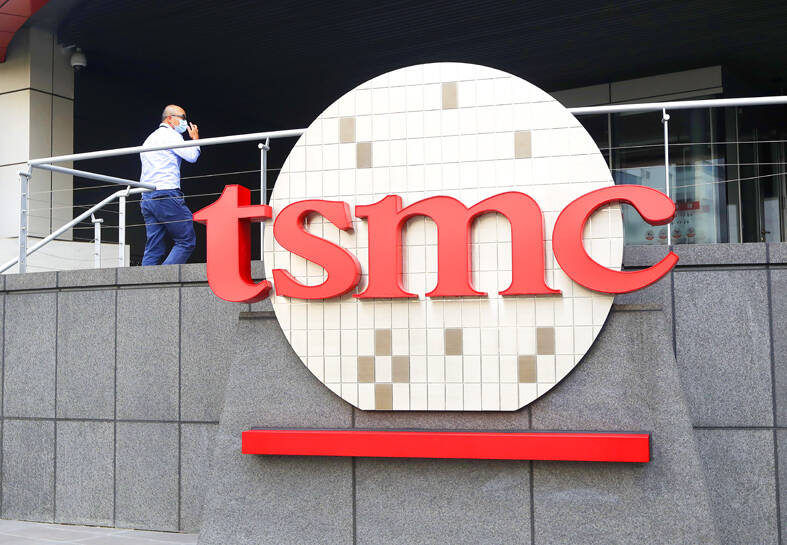Taiwan Semiconductor Manufacturing Co (TSMC, 台積電) yesterday said its operations were not affected by a spate of strong earthquakes that were centered in eastern Taiwan and shook much of the nation early yesterday morning.
In a statement, the world’s largest contract chipmaker said that soon after the earthquakes, including one of 6.3 on the Richter scale, the company followed standard procedures and evacuated workers from clean rooms in some of its fabs as a safety precaution.
TSMC said the workers were back at their posts and were all safe, while its fabs’ operations and industrial safety systems remained normal, despite the earthquakes.

Photo: AP
In the Hsinchu Science Park (新竹科學園區), Central Taiwan Science Park (中部科學園區) and Southern Taiwan Science Park (南部科學園區), where TSMC operates advanced fabs, the intensity of the strongest quakes — the effects of a seismic event at a certain place — reached 3 on Taiwan’s seven-tier intensity scale.
An intensity 3 means the earthquake is felt by everyone and shakes buildings, but does not usually lead to damage.
TSMC’s smaller rival United Microelectronics Corp (聯電) said its fabs in the Hsinchu Science Park and Southern Taiwan Science Park were not affected by the earthquakes.
The magnitude 6.3 earthquake struck Hualien at 2:32am, with its epicenter in Shoufeng Township (壽豐) at a depth of 5.5km. The quake’s intensity was highest in Hualien County, where it measured 5.
That was preceded just minutes earlier by a magnitude 6.0 earthquake. Its epicenter was off the Hualien coast in the Pacific Ocean at a depth of 10km. The intensity was also highest in Hualien County, where it measured 5.
The Central Weather Administration said these quakes were all aftershocks of the main earthquake that measured 7.2 on the Richter scale that struck Hualien County on April 3.

Shiina Ito has had fewer Chinese customers at her Tokyo jewelry shop since Beijing issued a travel warning in the wake of a diplomatic spat, but she said she was not concerned. A souring of Tokyo-Beijing relations this month, following remarks by Japanese Prime Minister Sanae Takaichi about Taiwan, has fueled concerns about the impact on the ritzy boutiques, noodle joints and hotels where holidaymakers spend their cash. However, businesses in Tokyo largely shrugged off any anxiety. “Since there are fewer Chinese customers, it’s become a bit easier for Japanese shoppers to visit, so our sales haven’t really dropped,” Ito

The number of Taiwanese working in the US rose to a record high of 137,000 last year, driven largely by Taiwan Semiconductor Manufacturing Co’s (TSMC, 台積電) rapid overseas expansion, according to government data released yesterday. A total of 666,000 Taiwanese nationals were employed abroad last year, an increase of 45,000 from 2023 and the highest level since the COVID-19 pandemic, data from the Directorate-General of Budget, Accounting and Statistics (DGBAS) showed. Overseas employment had steadily increased between 2009 and 2019, peaking at 739,000, before plunging to 319,000 in 2021 amid US-China trade tensions, global supply chain shifts, reshoring by Taiwanese companies and

Taiwan Semiconductor Manufacturing Co (TSMC, 台積電) received about NT$147 billion (US$4.71 billion) in subsidies from the US, Japanese, German and Chinese governments over the past two years for its global expansion. Financial data compiled by the world’s largest contract chipmaker showed the company secured NT$4.77 billion in subsidies from the governments in the third quarter, bringing the total for the first three quarters of the year to about NT$71.9 billion. Along with the NT$75.16 billion in financial aid TSMC received last year, the chipmaker obtained NT$147 billion in subsidies in almost two years, the data showed. The subsidies received by its subsidiaries —

Taiwan Semiconductor Manufacturing Co (TSMC) Chairman C.C. Wei (魏哲家) and the company’s former chairman, Mark Liu (劉德音), both received the Robert N. Noyce Award -- the semiconductor industry’s highest honor -- in San Jose, California, on Thursday (local time). Speaking at the award event, Liu, who retired last year, expressed gratitude to his wife, his dissertation advisor at the University of California, Berkeley, his supervisors at AT&T Bell Laboratories -- where he worked on optical fiber communication systems before joining TSMC, TSMC partners, and industry colleagues. Liu said that working alongside TSMC